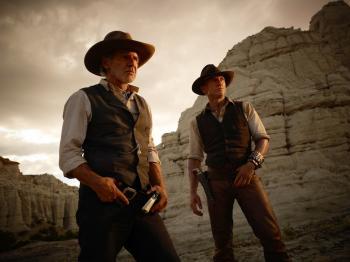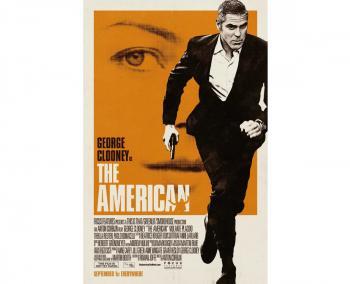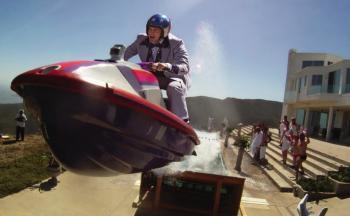The Curious Case of Benjamin Button is widely being compared with Forrest Gump thanks to some superficial similarities (historical events seen through the life of a single man).
Of course it’s actually exceedingly different. For starters, despite its popularity, Forrest Gump really isn’t that good. Benjamin Button, however, is.
Actually closer in tone to Tim Burton’s best film Big Fish (well it’s a toss-up between that and Beetle Juice) mixed with the metaphysical mumbo-jumbo of Francis Ford Coppola’s Youth Without Youth, Benjamin Button is a fantastical fable that stands as a prime example of the limitless boundaries of imagination and its power to transport you to other times and places.
The curious case of a man “born under unusual circumstances”, Benjamin Button is the tall tale of a baby born 80-something years old that then ages backwards throughout his life. Starring Brad Pitt as the not-so-ordinary man, a simplified summarisation of Benjamin Button would be that it is a portrait of 20th century American history, seen through the prism of a single soul. Of course that would be massively underselling it.
Because Benjamin Button is, in fact, so much more. It is a mesmerising, magical movie that muses on fate, love and romance, life and mortality and the inevitable effect of time on us all. It is a story of intersecting lives and incidents that provokes and affects, during and after its epic two hours 40 minutes runtime. It is a living, breathing weighty tome masterfully expounded from a 1921 F. Scott Fitzgerald short story by Eric Roth (famous for scripting, erm… Forrest Gump).
It is an exemplar of movie casting and acting, not just from the prosthetic and make-up suffering Brad-doing-Keanu and female lead Cate Blanchett (as Daisy, the love of Benjamin’s backwards life), but in the people that help to shape who they are along the way: the ever-excellent Tilda Swinton as Benjamin’s first love; a surprisingly subtle Jason Flemyng as Papa Button; a career-best Taraji P. Henson as Benjamin’s adopted mother; a scene-stealing Jared Harris as tugboat Captain Mike and Benjamin’s first boss; and the returning-from-the-wilderness Julia Ormond as Daisy’s daughter in the modern-day, Hurricane Katrina-based framing device.
It is a perfectly paced, perfectly directed, exquisitely singular piece of cinematic fiction that cements David Fincher’s place as the world’s premier auteuristic movie maker. It is all of these things and much, much more.
Perhaps, most significantly, it is an absolutely amazing mix of artistic and technological achievement. Because as beautifully written as the story is, as well acted as the parts are, and as well directed as Benjamin Button undoubtedly is, the poetry-in-motion end product could never have been achieved without the boundary-smashing technological wizardry, the truly exceptional make-up and the decades-spanning, fastidiously detailed art and set decoration to back up Roth, Fincher and favourite-leading-man Pitt’s vision and make this fairy tale feel as real and absorbing and life affecting as it does.
[etRating value=“ 4.5”]
Of course it’s actually exceedingly different. For starters, despite its popularity, Forrest Gump really isn’t that good. Benjamin Button, however, is.
Actually closer in tone to Tim Burton’s best film Big Fish (well it’s a toss-up between that and Beetle Juice) mixed with the metaphysical mumbo-jumbo of Francis Ford Coppola’s Youth Without Youth, Benjamin Button is a fantastical fable that stands as a prime example of the limitless boundaries of imagination and its power to transport you to other times and places.
The curious case of a man “born under unusual circumstances”, Benjamin Button is the tall tale of a baby born 80-something years old that then ages backwards throughout his life. Starring Brad Pitt as the not-so-ordinary man, a simplified summarisation of Benjamin Button would be that it is a portrait of 20th century American history, seen through the prism of a single soul. Of course that would be massively underselling it.
Because Benjamin Button is, in fact, so much more. It is a mesmerising, magical movie that muses on fate, love and romance, life and mortality and the inevitable effect of time on us all. It is a story of intersecting lives and incidents that provokes and affects, during and after its epic two hours 40 minutes runtime. It is a living, breathing weighty tome masterfully expounded from a 1921 F. Scott Fitzgerald short story by Eric Roth (famous for scripting, erm… Forrest Gump).
It is an exemplar of movie casting and acting, not just from the prosthetic and make-up suffering Brad-doing-Keanu and female lead Cate Blanchett (as Daisy, the love of Benjamin’s backwards life), but in the people that help to shape who they are along the way: the ever-excellent Tilda Swinton as Benjamin’s first love; a surprisingly subtle Jason Flemyng as Papa Button; a career-best Taraji P. Henson as Benjamin’s adopted mother; a scene-stealing Jared Harris as tugboat Captain Mike and Benjamin’s first boss; and the returning-from-the-wilderness Julia Ormond as Daisy’s daughter in the modern-day, Hurricane Katrina-based framing device.
It is a perfectly paced, perfectly directed, exquisitely singular piece of cinematic fiction that cements David Fincher’s place as the world’s premier auteuristic movie maker. It is all of these things and much, much more.
Perhaps, most significantly, it is an absolutely amazing mix of artistic and technological achievement. Because as beautifully written as the story is, as well acted as the parts are, and as well directed as Benjamin Button undoubtedly is, the poetry-in-motion end product could never have been achieved without the boundary-smashing technological wizardry, the truly exceptional make-up and the decades-spanning, fastidiously detailed art and set decoration to back up Roth, Fincher and favourite-leading-man Pitt’s vision and make this fairy tale feel as real and absorbing and life affecting as it does.
[etRating value=“ 4.5”]





